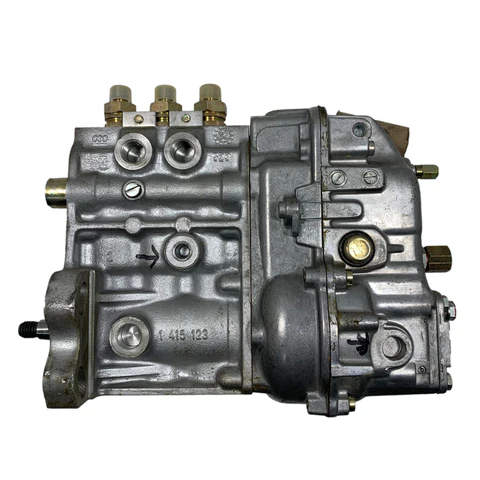Your vehicle’s engine relies on many components to run smoothly, but few are as critical as the fuel injection pump. This vital part ensures fuel reaches the engine efficiently, directly impacting performance. Properly maintaining your fuel injection pump can prevent costly repairs and keep your vehicle reliable. At Goldfarb & Associates, we emphasize proactive care to maximize its lifespan. By following simple steps, you can protect this essential component and enhance your engine’s efficiency.
Understanding the Fuel Injection Pump’s Role
The fuel injection pump plays a central role in your vehicle’s fuel system. It delivers the right amount of fuel to the engine at the correct pressure and timing. Without it, your engine would struggle to function properly. Knowing its importance helps you prioritize its care.
What Does the Fuel Injection Pump Do?
This pump pressurizes fuel and sends it to the injectors, which spray it into the engine’s combustion chamber. It ensures precise fuel delivery for optimal combustion. A well-functioning pump improves fuel efficiency and reduces emissions. Regular maintenance prevents wear and keeps it operating smoothly.
Why Lifespan Matters
A failing fuel injection pump can cause engine misfires, poor acceleration, or even complete breakdowns. Extending its lifespan saves you from unexpected repairs and maintains vehicle performance. Consistent care also supports long-term engine health, ensuring your car runs reliably for years.

Key Maintenance Practices for Longevity
Proper maintenance is the foundation of a long-lasting fuel injection pump. By adopting routine habits, you can prevent common issues and ensure smooth operation. Goldfarb & Associates recommends focusing on these essential practices.
Use High-Quality Fuel
Low-quality fuel often contains contaminants that can damage the pump over time. Always choose fuel from reputable sources to minimize debris and water content. Clean fuel reduces strain on the pump and prevents clogs. Additionally, consider using fuel additives designed to clean the system periodically.
Replace Fuel Filters Regularly
Fuel filters trap dirt and debris before they reach the pump. A clogged filter forces the pump to work harder, leading to premature wear. Replace filters as recommended by your vehicle’s manufacturer, typically every 20,000 to 30,000 miles. This simple step protects the pump and maintains fuel flow.
Monitor for Warning Signs
Pay attention to symptoms like rough idling, reduced power, or difficulty starting the engine. These could indicate pump issues. Addressing problems early prevents further damage. Regular inspections by professionals, like those at Goldfarb & Associates, can catch issues before they escalate.
Professional Care and Inspections
While personal maintenance is crucial, professional care ensures your fuel injection pump stays in top shape. Experts have the tools and knowledge to diagnose and fix issues effectively. Scheduling regular checkups can make a significant difference.

Importance of Expert Diagnostics
Mechanics use specialized equipment to test pump pressure and performance. They can identify issues that aren’t obvious during regular use. Professional diagnostics catch small problems before they become major. This proactive approach extends the pump’s lifespan significantly.
Benefits of Timely Repairs
If a problem is detected, quick repairs prevent further damage to the pump or engine. For instance, fixing a minor leak can avoid costly replacements. Skilled technicians ensure repairs meet manufacturer standards. Trusting experts ensures your pump remains reliable.
Recommended Maintenance Schedule
- Every 6 months: Inspect fuel system for leaks or wear.
- Annually: Test pump pressure and clean injectors.
- As needed: Replace worn components promptly.
Protecting Your Pump from Common Issues
Certain conditions can shorten the lifespan of your fuel injection pump. By understanding these risks, you can take steps to avoid them. Preventive measures keep your pump functioning efficiently.
Avoiding Contaminated Fuel
Contaminants like dirt or water can enter the fuel system and harm the pump. Store fuel properly if you use external tanks, and avoid filling up during fuel deliveries at stations. Clean fuel reduces the risk of internal damage. Regular system flushes also help maintain pump health.
Preventing Overheating
Excessive heat can strain the pump, especially in high-performance vehicles. Ensure your engine’s cooling system is working correctly to avoid overheating. Check coolant levels regularly and address any cooling issues promptly. This protects both the pump and the engine.
Managing Wear and Tear
Over time, continuous operation causes gradual wear on fuel injection pump components. However, adopting gentle driving habits can significantly reduce strain on the fuel system. Avoid aggressive acceleration, rapid throttle changes, and frequent high-speed driving. Maintaining steady speeds allows the fuel injection pump to operate efficiently and helps extend its service life and overall engine reliability.
Fuel System Upgrades for Enhanced Durability
Upgrading parts of your fuel system can further protect your fuel injection pump. Modern components are designed for durability and efficiency. Consider these options to boost longevity.
Upgrading to Advanced Fuel Filters
High-performance filters trap smaller particles than standard ones. They provide better protection for the pump and injectors. Upgraded filters are especially useful for older vehicles or those in dusty environments. Consult a professional to choose the right filter for your car.
Installing Fuel Additives
Some additives clean the fuel system and lubricate the pump. They reduce friction and prevent buildup inside the pump. Use additives sparingly and choose products compatible with your vehicle. Overuse can sometimes cause more harm than good.

Conclusion
Extending the lifespan of your fuel injection pump requires consistent care and attention. By using high-quality fuel, replacing filters, and scheduling professional inspections, you can keep your pump in excellent condition. Avoiding common issues like contamination and overheating further protects this vital component. With proper maintenance and timely repairs, your vehicle’s fuel system will perform reliably for years, ensuring a smooth and efficient ride.
FAQs
What causes a fuel injection pump to fail?
A fuel injection pump can fail due to contaminated fuel, clogged filters, or overheating. Poor maintenance also contributes to wear. Regular inspections and clean fuel help prevent failure. Addressing issues early avoids major damage.
How often should I replace my fuel filter?
Replace your fuel filter every 20,000 to 30,000 miles, depending on your vehicle’s manual. Regular replacement prevents clogs and protects the pump. Always check with your mechanic for specific recommendations. This ensures optimal fuel flow.
Can low-quality fuel damage my pump?
Yes, low-quality fuel often contains dirt or water that harms the pump. Contaminants cause clogs and increase wear. Always use fuel from trusted stations. Fuel additives can also help keep the system clean.
Why is professional care important for my pump?
Professionals use advanced tools to diagnose and fix pump issues accurately. They catch problems early, preventing costly repairs. Regular checkups ensure the pump meets performance standards. This extends its lifespan significantly.


